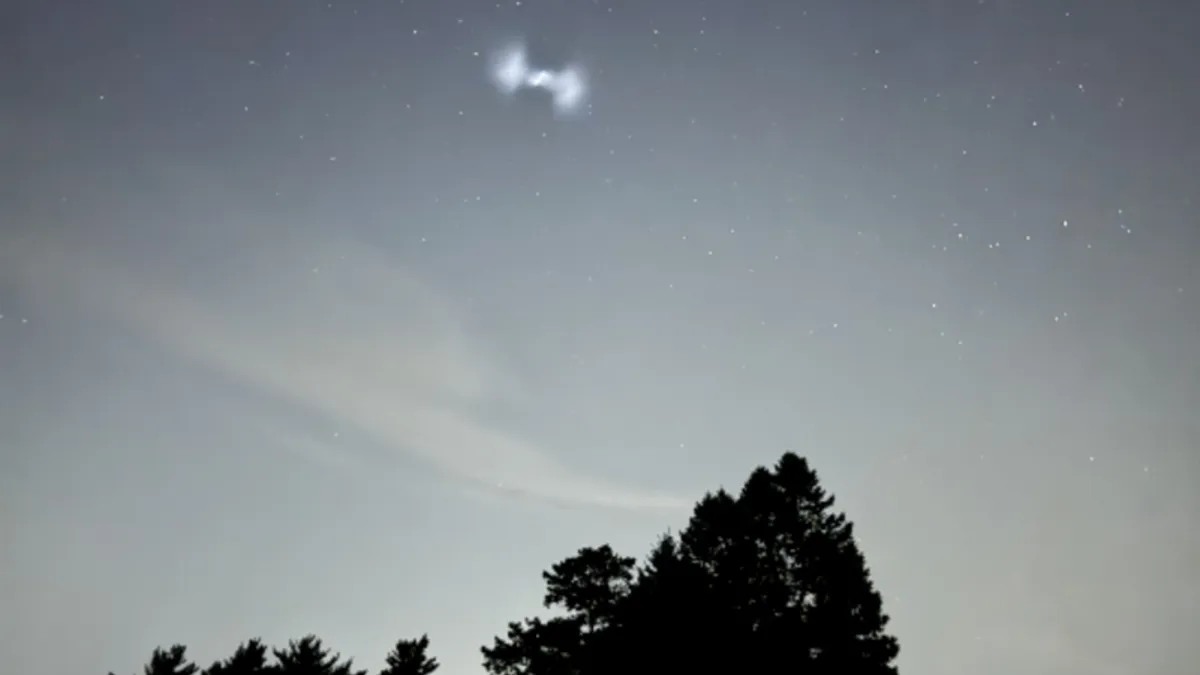
During the peak of the Perseid meteor shower, stargazers across vast regions of the U.S. were unexpectedly captivated by an enchanting display in the night sky: a giant spiral of ghostly white light. While astronomers have identified the phenomenon, the exact origin remains a topic of discussion among experts.
On the evening of August 12, around 10:30 p.m. ET, just as the Perseid meteor shower reached its zenith, observers in various states, including Maryland, New York, New Jersey, Illinois, Ohio, and Nebraska, witnessed a faint point of light that rapidly expanded into a luminous whirlpool. This captivating spiral illuminated the sky for approximately ten minutes before fading into obscurity.
Photographer Joshua Thum captured stunning images of the phenomenon over Yerkes Observatory in Williams Bay, Wisconsin, while astrophotographer Dan Bush recorded remarkable footage of the spiral’s movement across the night sky in Albany, Missouri.
Experts have determined that the glowing spiral was composed of rocket fuel expelled from a spacecraft preparing to re-enter Earth's atmosphere. During this process, the fuel freezes into a cloud of tiny crystals that reflect sunlight, creating a shimmering effect visible from the ground until the crystals dissipate and vanish from sight. The spiral shape is a result of the rocket's spin at the time of fuel release, which shapes the crystalline cloud.
Initial reports indicated that the spiral was associated with a United Launch Alliance Vulcan Centaur rocket, which had launched from Cape Canaveral, Florida, at 8:56 p.m. ET, successfully deploying two military satellites into orbit. However, further investigation revealed that the source was likely the Ariane 6 rocket launched by the European Space Agency from a spaceport in French Guiana just 19 minutes earlier, which was responsible for releasing a European weather satellite.
This discrepancy has fueled debate regarding the true origin of the spiral. Astrophotographer Dan Bush shared his thoughts with Spaceweather.com, stating, "There’s a lot of debate about this one as to where it came from and what we were witnessing as far as the geometry of what was going on." Jonathan McDowell, an astronomer at the Harvard & Smithsonian Center for Astrophysics, expressed his belief that the Ariane 6 rocket is the more likely culprit based on its trajectory, yet he acknowledged the ongoing uncertainty.
Glowing spirals and similar light phenomena have become increasingly common, coinciding with a significant uptick in rocket launches, largely attributed to the rise of private space companies such as SpaceX. Many of these celestial displays have been associated with SpaceX's Falcon 9 rockets, earning them the nickname SpaceX spirals. A notable example occurred in March when a gigantic whirlpool shimmered above the U.K. and parts of Europe.
The recent spiral light show witnessed during the Perseid meteor shower not only captivated audiences but also sparked discussions about the implications of increased rocket activity in our atmosphere. As the frequency of launches continues to rise, we may see more of these stunning phenomena lighting up our skies.